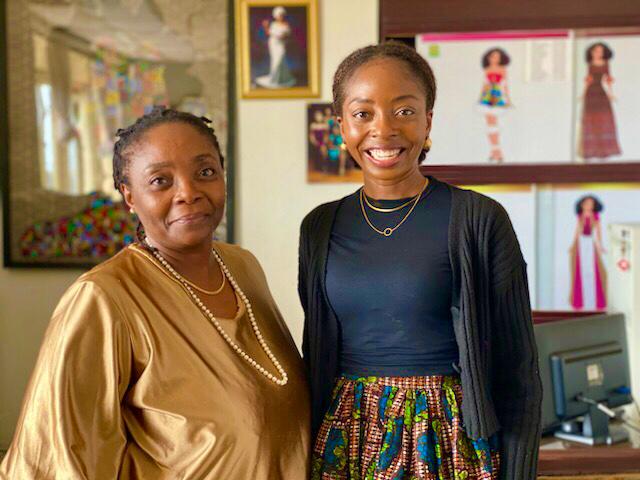If you are active on Twitter, you get a daily dose of the buzz around the tech industry. Many pioneers have recognized the need for tech education and launched programs like Decagon and Alt School to enhance the quality and quantity of local tech talent. But before tech took our social sphere by storm, the fashion industry was the golden child. Despite the shift in focus, fashion remains a goldmine. And with the global tech revolution taking a bit of a breather, it is a good time to revisit the question: What about the fashion industry?

The fashion industry contributes significantly to Nigeria’s GDP, and the creative sector (of which fashion is a huge chunk) is the second-highest employer of labour after agriculture, contributing to the earnings of 70% of Nigerian graduates between 2011 and 2014. Yet, the industry lacks even a fraction of the investment in structured education the tech industry receives. It’s no wonder we haven’t fully tapped into our true potential.
For the African fashion industry to grow, we need a steady supply of skilled fashion professionals to meet the demand across design, production, marketing, and retail. At its peak in the 1980s, the industry employed 350,000 skilled workers. In 2016, the record of certified fashion workers was only 27,000 people. Although the actual number of current workers in the industry is much higher, the informal training they receive limits productivity. To meet the demand for African fashion, we must increase the quality and quantity of awarded degrees, diplomas, and certifications in fashion-related disciplines. In countries like India, where there have been substantial investments in fashion education, the fashion industry has become a powerhouse. India is the third largest apparel exporter in the world, accounting for 11.4% of their total exports and driving employment and entrepreneurship. The Indian fashion industry employs 45 million people, of which 12.9 million are formally trained.
Imagine the possibilities if we replicate India’s fashion industry growth and success in Africa. By equipping individuals with the skills and knowledge needed to establish their fashion businesses or gain employment in fashion businesses, we create a ripple effect of economic empowerment: job opportunities increase, local talent flourishes, and economic growth becomes a reality.

I spent an afternoon with the Head of the Fashion Design department at Yaba College of Technology (YABATECH), Sade Thompson, and she provided factual evidence for many of my hypotheses. To present these hypotheses in full context, I would draw parallels from other countries to underscore why education is crucial to driving the African fashion industry forward and how our institutions, starting with YABATECH, can replicate their success. Fashion education plays a vital role in the African fashion industry in five ways:
- Translating creative talent into technical expertise
- Producing value-driven professionals
- Fostering international collaborations and exposure
- Preserving African creative cultural heritage
- Facilitating ecosystem development and innovation
Translate creative talent into technical expertise:
Fashion education serves as a bridge between raw talent and professional expertise. It equips individuals with the technical skills, industry knowledge, and creative mindset necessary to thrive in the competitive fashion sphere. The Nigerian fashion industry operates largely on talent, complemented by a thin layer of training. But by offering comprehensive curricula covering multiple aspects of fashion, African institutions can nurture and develop the abundant creative talent in the region.

The transformation of talent into expertise has been central to the emergence of fashion capitals in countries such as France, Italy, the United States, and the United Kingdom. These countries have robust fashion education systems to cultivate the talent pool and shape their fashion industries. Central Saint Martins, part of the University of the Arts London, is renowned for its fashion programs. It offers degrees in fashion design, communication, business, and many other fashion-related disciplines.
YABATECH’s School of Art, Design, and Printing is the national leader in art education. With deliberate investments in her fashion design, graphics, and printing programs, the institution can be well-positioned as the go-to institution for fashion education.
Produce value-driven professionals:
Fashion institutions can play a crucial role in developing business acumen among aspiring fashion entrepreneurs. Fashion education should go beyond creativity and design to impart practical skills that make graduates industry-ready. Through hands-on training, internships, and collaborations with fashion houses and brands, students can gain valuable experience and industry exposure. The practical training equips them with the ability to navigate the complexities of the fashion business, including production, marketing, branding, and retail.
Fashion institutes and universities in renowned fashion capitals like Paris, Milan, and New York have long-standing relationships with established fashion houses, creating valuable opportunities for internships and employment for their students. By emulating such models, African institutions can bridge the gap between education and industry to ensure graduates have the skills and networks to thrive.
YABATECH’s status as Nigeria’s oldest higher institution provides a solid foundation of knowledge, experience, and prestige – crucial components of global fashion capitals such as Paris, London, and New York. With YABATECH’s help, Lagos can join these ranks and establish a strong institutional heritage for fashion in the city.
Foster international collaborations and exposure:
Formal fashion education is a pathway for African fashion professionals to establish connections and collaborations with international institutions and industry leaders. Through partnerships and participation in international fashion events, institutions, and leaders, students gain exposure, expand their networks, and learn global best practices.
Institutions like Central Saint Martins in the UK, Parsons School of Design in the US, and the Instituto Marangoni in Italy are known for their international collaborations and exchange programs. African fashion schools can follow suit by forming partnerships with renowned institutions, organizing international study tours, and inviting guest lecturers from the global fashion community.
The rise of other higher institutions across the continent has drowned out the foundational reputation of YABATECH. Despite this, YABATECH has excelled in its disciplines: art, technology, and industry. International collaborations provide YABATECH with a platform to reestablish its deserved global visibility as the premier art education institution.
Preserve African creative cultural heritage:
African fashion is a melting pot of diverse cultures, each with its unique story, symbolism, and craftsmanship. Fashion education can play a role in preserving and promoting cultural heritage through innovation. By incorporating traditional techniques, materials, and motifs into contemporary designs, institutions can empower students to become custodians and ambassadors of the African cultural identity.
Countries like Japan, India, and Peru have successfully harnessed their cultural heritage and transformed them into thriving fashion industries. Similarly, African fashion education can encourage the exploration and reinvention of traditional craftsmanship, textiles, and design elements, enabling designers to create contemporary African fashion that resonates with global audiences.
YABATECH can contribute to preserving African cultural heritage through fashion education. With its rich history and reputation in the field of creative arts, the college has the opportunity to integrate traditional Nigerian craftsmanship, textiles, and design elements into its fashion curriculum. By providing students with a deep understanding of their cultural roots and encouraging them to explore and reinterpret traditional techniques, the college can nurture a generation of fashion professionals skilled in both the contemporary and traditional aspects of African fashion.

Facilitate ecosystem development and innovation
Fashion education acts as a catalyst for building a thriving fashion ecosystem within Africa. Reputable fashion institutions create an ecosystem to nurture creativity, foster innovation, and facilitate knowledge exchange.
Countries like Japan and South Korea have invested significantly in fashion education, resulting in vibrant fashion industries known for their design excellence, technological advancements, and business acumen. By taking inspiration from their models, African nations have the opportunity to lay a solid foundation for their fashion sectors.
YABATECH has the potential to play a significant role in developing a thriving fashion ecosystem. By forging industry partnerships, establishing incubation and innovation centres, organizing fashion events, and investing in research, YABATECH can create an environment that nurtures creativity, innovation, and collaboration.
***
So, let’s go back to the beginning. I have established there is a limit to how far African fashion can grow with an underskilled workforce. But by emulating successful value-focused educational models from countries like India, France, and the United Kingdom, African institutions can nurture creative talent, produce industry-ready professionals, foster collaborations, preserve cultural heritage, and facilitate innovation. YABATECH, with its prestigious reputation and history, has the potential to lead this transformation and establish Lagos as a fashion capital. Through education, the African fashion industry can create economic opportunities, empower local talent, and drive sustainable growth.




